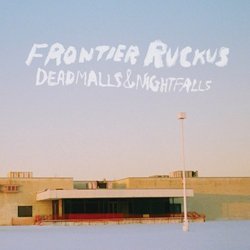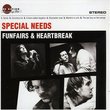| All Artists: Frontier Ruckus Title: Deadmalls & Nightfalls (Dig) Members Wishing: 2 Total Copies: 0 Label: Ramseur Rec. Original Release Date: 1/1/2010 Re-Release Date: 7/20/2010 Genres: Pop, Rock Style: Number of Discs: 1 SwapaCD Credits: 1 UPCs: 626570608189, 626570608189 |
Search - Frontier Ruckus :: Deadmalls & Nightfalls (Dig)
 | Frontier Ruckus Deadmalls & Nightfalls (Dig) Genres: Pop, Rock
|
Larger Image |
CD DetailsSimilar CDs
|
CD ReviewsChanneling urban decay into emotional salvation Stargrazer | deep in the heart of Michigan | 08/18/2010 (5 out of 5 stars) "A slightly more subdued yet no less involving record than their debut, "The Orion Songbook," Frontier Ruckus' sophomore album (and first to come out on Ramseur Records, affording much more widespread distribution and visibility) continues the poetically-informed lyrical observations of singer/guitarist Matthew Milia, underpinned by a softly baroque bed of banjo, muted trumpet, saw, bass and sparsely swinging drums. This time out there is a thematic arc: the desolation of formerly bustling suburbs and sprawling, overgrown shopping complexes as Michigan's fragile economy fractures and filigrees. This is the simplistic overview of an album that covers a rather wide plane of emotional territory, however, from sexual nostalgia and electric desire to reflective warmth and bittersweet remembrance.
Listeners may find that Milia codes his emotional data, littering it with images and smells, so that "Deadmalls and Nightfalls" invites psychological archeology which spools out over repeated listens. Often the lyrics don't seem to have singular meaning; they are soft-focused and glimpse-like. And if the newer melodies don't seem as immediate or rousing as older songs like "Adirondack Amish Holler" off the first album, that too is an illusory and evasive observation, ducking into the corners and shadows of sense-memory. There is quite a bit of contained energy in the brass breakdowns of "Silverfishes," the opening song "Nerves Of The Nightmind," and the album's longest track "Pontiac, the Nightbrink." "Deadmalls" represents tangible growth, outward and inward with a certain degree of offset to it -- an off-register letterpress print over polaroids and yellowed newspaper advertisements saved from the memory of a sunnier time that promised it would be eternal. It wasn't eternal, but it fuels and warms the proceedings in a way that's anything but flatly nostalgic. The album bristles with quiet vitality, a forward glance through the past littered with numerous lost dreams and disposable cups, the crumbling Helvetica signage of the 1980s now sun-faded and redolent with pathos." |

 Track Listings (12) - Disc #1
Track Listings (12) - Disc #1


